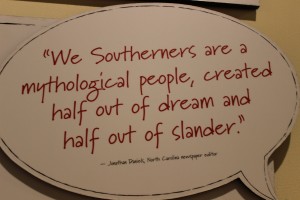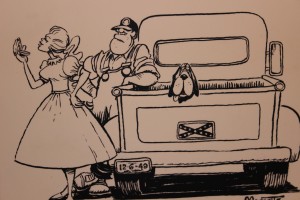On Thursday, March 14, a panel of three local cartoonists and the head of the Political Science department at Western Carolina University met to discuss stereotypes and social identity in cartoons.

One display from the exhibit "Comic Stripped" at WCU's Mountain Heritage Center. Photo by Heather Mason
Brent Brown, Randy Molton and David Cohen understand the world of cartoons because they have made it their passion and livelihood. Men comprise much of the cartoon world and they offered their insight on cartooning and its long history with the use of stereotypes, particularly southern stereotypes.
The panel discussion coincided with the exhibit “Comic Stripped,” currently on display at the Mountain Heritage Center through May 14. Cartoons have a deep seeded past of using southern stereotypes to create colorful characters. Characters such as “Lil Abner” set the stage for how southerners were viewed. Is a stereotype a fair gage of how people really are? According to cartoonist Cohen, “there is always a kernel of truth in stereotypes.” Brown agreed that stereotypes are created for a reason.
The three cartoonist on the panel explained that, as cartoonist, they have a very small amount of time and space to create a character and to tell a story. The characters have to be able to speak for themselves and using stereotypes is one way to do this. Unlike writers who can use several paragraphs to “flesh out” a character, a cartoon has to be able to explain what the character represents with one picture. These stereotypes are considered “shortcuts” to the point that is being made. Cartoonists often employ stereotypes to do this.
Chris Cooper, head of the political science department at WCU, was also on the panel to give a political view point on the use of southern stereotypes. Cooper has spent time studying and focusing on regional identity. Through his studies, Cooper has noticed a shift in the nature of southern identity. Along with Gibbs Knotts, a former faculty member at WCU, Cooper studied the use of terms such as “Dixie” and “southern” in business titles in the south. What Cooper and Knotts discovered was that, although there was a decline in terms such as “Dixie”, there seemed to be an increase in businesses using the term “southern” in their title.
“The rebel flag type of identity has declined,” said Cooper. “People still cling to regional identity. There is a resurgence of southern pride and it is prevalent among more affluent, educated areas.”
Another interesting discovery that Knotts and Cooper found was that African Americans are slightly more likely to identify themselves as southern.
The electoral process is another arena where southerners wave their flag of pride. Politicians are well known for embracing southern heritage in order to win over voters.
Cartoons from the past that depicted the barefoot, snuff spitting, uneducated southerner paved the way for many popular television shows that depicted the same characters. “Green Acres”, “Petticoat Junction”, and “The Beverly Hillbillies”, were very popular among viewers and these shows cashed in on the southern stereotypes.
Cooper feels that there is more to be learned about these stereotypes and he said, “In general, academia should spend more time looking at cartoonist and how things are portrayed.”
For now, Brown, Molton and Cohen will use whatever means necessary to tell their stories through pictures and cartoons.
“It seems that white, southerners are the last group that it is OK to make fun of,” said Cohen. And he added, for the record, “I hate sweetened iced tea.” Well, that shoots one stereotype out of the water.
The slide show features exhibits at the “Comic Stripped” presentation at the Mountain Heritage Center at WCU. Also in the slide show are images of the panel of cartoonists, Brent Brown, David Cohen and Randy Molton, along with Chris Cooper, professor of political science at WCU.



